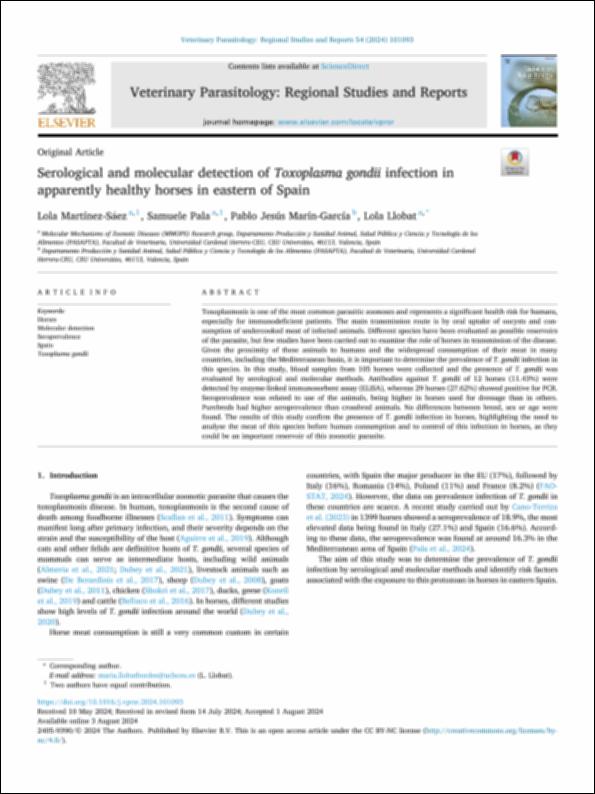Please use this identifier to cite or link to this item:
http://hdl.handle.net/10637/16110Serological and molecular detection of "Toxoplasma gondii" infection in apparently healthy horses in eastern of Spain
| Title: | Serological and molecular detection of "Toxoplasma gondii" infection in apparently healthy horses in eastern of Spain |
| Authors : | Martínez Sáez, Lola Pala, Samuele Marín García, Pablo Jesús Llobat Bordes, Lola |
| Keywords: | Toxoplasmosis; Horses; Caballos; Spain; España; Parasitology; Parasitología veterinaria; Zoonoses; Zoonosis |
| Publisher: | Elsevier |
| Citation: | Martínez Sáez, L., Pala, S., Marín García, P.J. & Llobat, L. (2024). Serological and molecular detection of Toxoplasma gondii infection in apparently healthy horses in eastern of Spain. Veterinary Parasitology: Regional Studies and Reports, vol. 54 (sep.), art. 101093. DOI: https://doi.org/10.1016/j.vprsr.2024.101093 |
| Abstract: | Toxoplasmosis is one of the most common parasitic zoonoses and represents a significant health risk for humans, especially for immunodeficient patients. The main transmission route is by oral uptake of oocysts and consumption of undercooked meat of infected animals. Different species have been evaluated as possible reservoirs of the parasite, but few studies have been carried out to examine the role of horses in transmission of the disease. Given the proximity of these animals to humans and the widespread consumption of their meat in many countries, including the Mediterranean basin, it is important to determine the prevalence of T. gondii infection in this species. In this study, blood samples from 105 horses were collected and the presence of T. gondii was evaluated by serological and molecular methods. Antibodies against T. gondii of 12 horses (11.43%) were detected by enzyme-linked immunosorbent assay (ELISA), whereas 29 horses (27.62%) showed positive for PCR. Seroprevalence was related to use of the animals, being higher in horses used for dressage than in others. Purebreds had higher seroprevalence than crossbred animals. No differences between breed, sex or age were found. The results of this study confirm the presence of T. gondii infection in horses, highlighting the need to analyse the meat of this species before human consumption and to control of this infection in horses, as they could be an important reservoir of this zoonotic parasite. |
| URI: | http://hdl.handle.net/10637/16110 |
| Rights : | http://creativecommons.org/licenses/by-nc/4.0/deed.es Open Access |
| ISSN: | 2405-9390 (Electrónico) |
| Supported by: | Acuerdo Transformativo – 2024 |
| Issue Date: | Sep-2024 |
| Appears in Collections: | Dpto. Producción y Sanidad Animal, Salud Pública Veterinaria y Ciencia y Tecnología de los Alimentos |
Items in DSpace are protected by copyright, with all rights reserved, unless otherwise indicated.


